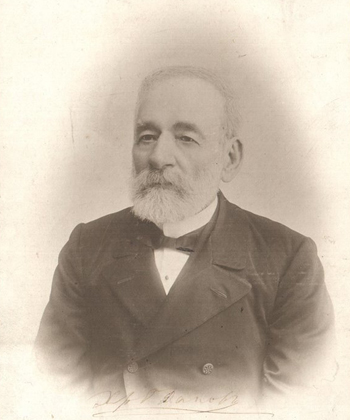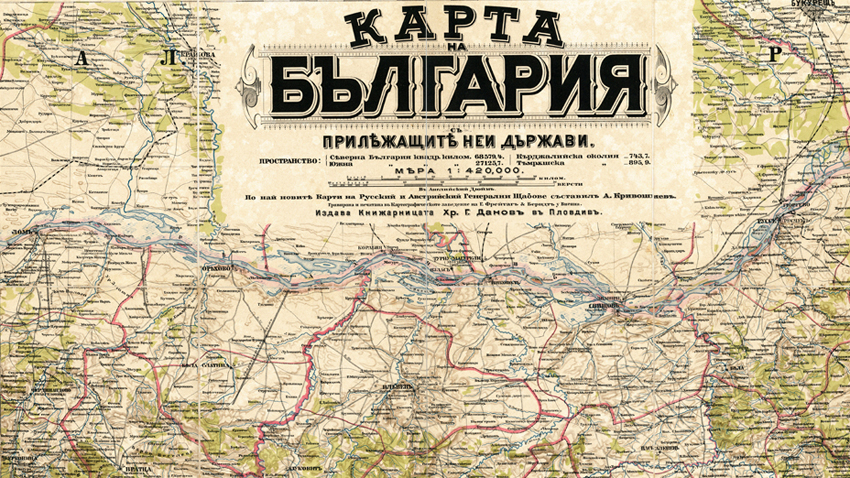Any patriot in present-day Bulgaria will find plenty of inspiration in the life and work of Hristo G. Danov (1828 –1911). He was the first in the country to set up a company aimed to print and distribute Bulgarian books thus becoming a founding father of Bulgaria’s professional book publishing of modern time. The company opened shop in 1857 while Bulgaria was still a province of the Ottoman Empire.
 Discussing Hristo G. Danov writer Vladimir Svintila once said that through his publishing business he changed the mentality of Bulgarians. In 1905, when the 50th anniversary of his book publishing career was celebrated in Plovdiv, Danov himself exclaimed: „Believe me, it has never occurred to me that one day my modest efforts would be so highly appreciated.”
Discussing Hristo G. Danov writer Vladimir Svintila once said that through his publishing business he changed the mentality of Bulgarians. In 1905, when the 50th anniversary of his book publishing career was celebrated in Plovdiv, Danov himself exclaimed: „Believe me, it has never occurred to me that one day my modest efforts would be so highly appreciated.”
Hristo G. Danov’s publishing work started in 1855 when he printed a calendar for 1856 in Belgrade. It included information about holy Christian feasts and other useful details. From that point on Danov gave more effort to publishing textbooks aiming to provide for accessible educational material from various fields of knowledge, says Vera Kissyova, curator at Hristo G. Danov Museum-House in Plovdiv:
„Prior to publishing Hristo Danov worked as a teacher. At that stage of development of Bulgarian society while the country was still an Ottoman province, Bulgarian schools felt a strong need for textbooks. Back at that time there were about 30 printed textbooks in the Bulgarian language and Danov was determined to fill in this huge gap."
For his almanac Letostruy Hristo Danov wrote articles about burning issues of the time from the spheres of education, community centers and the industry. What were his views about the development of society?
„At the heart of the development of man and society Danov placed education and the development of the individual. While teaching he stressed practical education. Instead of mechanical knowledge he tried to promote practical thinking. He was also busy helping further education of Bulgarian young people abroad – they had to go to the best farming schools, so as to make sure that when they return to Bulgaria they would contribute to the economy of the country.”

What family did Hristo G. Danov come from?
„He was born to a family of a craftsman in the village of Klissoura, Central Southern Bulgaria. His father died early. To help the family Hristo was sent to Plovdiv to serve as an apprentice to a craftsman. Well, the teenager was keen on getting better education, so his mother – at the cost of deprivation and self-denial, succeeded to support his studies.”
One of Hristo Danov’s teachers was Nayden Gerov, one of the greatest Bulgarian educationists during the National Revival (18-19 c.) Gerov had a university degree from Russia. Upon graduation, Danov became a teacher – in his home village and other villages in the region like Strelcha and Perushtitsa where he founded a mutual instruction school based on the Bell-Lancaster system. He also introduced schooling for girls and evening schooling for adults.
In 1892 (a few years after the liberation of Bulgaria from Turkish rule) Hristo G. Danov was among the organizers and participants in the First Agricultural and Industrial Fair in Plovdiv, the prototype of today’s International Plovdiv Fair. At this event that was exceptional for the time he was awarded with medals for his publishing activity and for the map of Bulgaria and its neighboring countries released by him.

In post-Liberation Bulgaria Hristo G. Danov was elected Plovdiv Lord Mayor (1897-1899). During his term he began the implementation of the urban development plan of Czech-Bulgarian architect Josep Schnitter. The mayor initiated the afforestation of the Plovdiv hills, thanks to which today their lush greenery gives the ancient city a gulp of fresh air. Danov was also keen to promote industry and contributed to the opening of a few factories including a sugar processing enterprise. Vera Kissyova brings another curious detail:
„During the mayoral term of office of Hristo G. Danov, the Bulgarian monarch Prince Ferdinand was keen to build a residence on one of Plovdiv’s celebrated hills. Hristo Danov refused to satisfy this royal whim and kept the hill for the citizens of Plovdiv that now boasts lovely park areas and recreation corners.”
Over his conflicts with the central government Hristo G. Danov was deprived of his salary as mayor of Plovdiv but he made no effort to defend his rights and chose to work for his city without any pay whatsoever.
English Daniela Konstantinova
Spanish writer Ana Andreu Baquero is coming to Bulgaria to present her novel "The Princess of Buchenwald" , the Cervantes Institute, which is organising the event with the Hermes publishing house, announced. The presentation of the book is scheduled..
On February 12, in the cosy space of the Bulgaria Gallery in the heart of Rome, compatriots and Italians will gather to commemorate a Bulgarian healer who with perseverance and dedication managed to change the lives of thousands of..
"Music discovered me," says Georgi Grozev and tells us with a smile how in kindergarten he went to sign up for piano lessons on his own. "And that is how my journey in music started, almost as a joke." Georgi Grozev studies..

+359 2 9336 661
